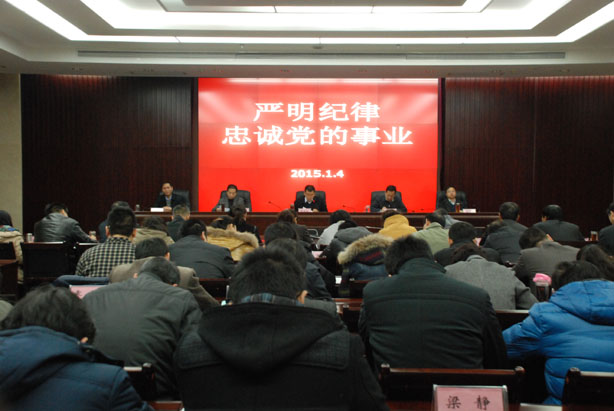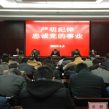
Seeking Loyalty Amongst the Four Key Groups – The Tactics of Xi’s Domestic Politics
Publication: China Brief Volume: 16 Issue: 5
By:

Recent calls for loyalty to the Chinese Communist Party, and particularly its top leadership, have brought renewed attention to this important internal messaging phenomenon. However, insistence on loyalty is not a new phenomenon in the People’s Republic of China, and historical context and examination of recent loyalty campaigns provide useful background to understanding Chinese President and Communist Party General Secretary Xi Jinping’s recent series of high-profile visits and speeches involving loyalty to the Party. Going back to the previous generation of leaders, for example, during the 2000s, in the era of Hu Jintao, there was the principle of the “Three Supremes”—upholding the Chinese Communist Party’s (CCP) cause, the people’s interests and the constitution and laws. But under Xi Jinping, the quest for loyalty, the groups targeted in the campaign, and the ways that loyalty has been articulated are different.
Xi Jinping’s appearance at the Central Chinese Television station on 16th February was treated as proof of a return to Maoist style politics. An official Xinhua English-language news release simply stating that “[Xi] encouraged them to be more down to earth in their approach and to report on topics that interest the public” (Xinhuanet, February 19). The Chinese language account of the meeting was more forthcoming, however, stating that the prime message he had conveyed while meeting journalists was to better disseminate “messages of Marxism, the advocacy of the Party, and the reform mission” saying that the state media was “a reflection of the voice of the people” and must “protect Party power and protect Party unity.” He finally urged the media to “be truthful” (Xinhuanet, February 19).
Visiting the offices of State media to promote these “requests” to stay on message is only part of a process of negotiation Xi has been engaged in since he became China’s top leader. The groups which he has been most assiduous in conveying the various demands for loyalty to are, primarily, Communist Party members, democratic groups, formers of public opinion (including media figures) and then the military. In each case, the approach has been different, the tone variegated, but the underlying basis of the appeal the same: China is in a period of potential crisis, it is facing huge challenges, the international situation is precarious, so supporting, serving and standing by the Party is in China’s national interests.
For Party members, particularly high-level party members, this message has been unrelenting. In 2013, speaking at a variety of meetings within the Party, Xi had returned to the theme of his first words as General Secretary in November 2012: the growing gap between the Party and those it was meant to lead. But by April 2013 he was explaining why this had happened—a result of the reforms and marketization, the distractions this had offered, and the ways in which, in marketized and market China, cadres were “buying and selling power” (CCTV.com, April 19, 2013). There needed to be clarity. The market was fine for material goods, not for Party assets—its core power and responsibilities. It was a desecration of the Party’s privileged role in society. “The Party,” Xi stated, “had to govern itself well.” The problem was fundamentally that Party officials, particularly leading Party officials (领导干部) had “problems in faith, thought, and in their work” (CCTV.com, November 23, 2014).
To remedy the Party’s failings, Xi demanded, “Party members… must seriously discipline their politics.” The attitude held by some cadres was that as long as they thought they were well behaved, then it was alright to ignore what others were up to. Such self-protecting collusion in the administering elite has sowed poison amongst the broader public (CCTV.com, October 23, 2014). Wealth, economic success, and the capitalist looking veneer had gone to some cadre’s heads. This arrogance and falling out of touch with people is precisely the symptoms that Chinese elite leaders and analysts have identified as the main cause of the demise of the Communist Party of the Soviet Union.
Party leaders, right at the top of the CCP, needed to know where their best interests were served. They needed to understand, as said Xi during another Politburo meeting in mid-2015, that they could “rise and fall.” They had no divine right to occupy the positions they were in. The implication was clear. “Good cadres are close to the people,” Xi stated. But they are also being molded by fear and worry, because an era of discipline and an extra layer of judgement are upon them, one not just about delivering sold GDP, but about demonstrating fidelity, loyalty, to the Party cause (Xinhuanet, June 26, 2015).
Democratic groups mark the second constituency being lobbied for loyalty. Tactically, they can only figure once party officials and members have got the message because of their political marginality. With them, Xi’s appeal has been more weighted on the idea that a communist Party that is able to govern itself well is in their interests. But also like them, the underlying message is based on worries and anxieties about the crucial stage China is now entering. Addressing a group of Patriotic Democratic Party members, non-Party members, and figures from social groups in July 2015, Xi stated that the prime objective now is to support stability, and to “improve economic quality.” This was the party’s strategic aim. Supporting it was in the interests of the groups Xi addressed (Xinhuanet, July 30).
For the third group, media figures in particular, and those regarded as having a role to play over formation of public opinion, the February visit to CCTV typifies this approach. Loyalty here is predicated more on the idea of responsibility, of the media “reflecting the voice of the people,” and of having a raft of protective duties, primarily through the Party to the people. There was also, in comments made in late 2015 by Xi to media figures, a demand that they act patriotically, and “love their country” (Xinhuanet, December 31, 2015). So while media figures and those who have influence are not being railed at for material malfeasance, simple misuse of ideas and betrayal of core values, as they are now being articulated by the Party, is a kind of corruption.
For the fourth group, the military, the line is simpler. Loyalty here is not requested, nor negotiated—it is demanded. Speaking to the PLA leadership on January 11, 2016, Xi asserted that they had to keep close to the Party, that they needed to serve unified leadership in which their principle function was to support the Party’s power, hear its commands, and have a high notion of service (Xinhua, January 11, 2016). They figure in the equation of “strong country, strong military,” (富国强军) but interestingly, Xi in his speech offered no thematic context for why the military need to be loyal—just that they had to be.
It is noteworthy that over the last three years the one group Xi seems to have impressed with the fewest demands, requests and suggestions of loyalty on are state enterprises and the commercial world. An example is Xi’s April 28, 2015 speech in advance of Labor Day (劳动节; May 1), where he requested that workers deepen their socialist values, and their Chinese cultural understanding, but does not specifically demand loyalty (Xinhuanet, April 28, 2015). In view of their function as drivers of all-important economic growth, this is an interesting difference in treatment. Is is that their economic fortunes are regarded as so tied to the Party and its controls over economic space that they don’t need to be bluntly spoken to and messaged formally? Or is it simply that as economic and commercial actors (including state and non-state companies) they don’t figure in the Party’s conceptual world, and simply fall into the second group of non-political forces. Or is it finally that the Party in fact has no way to request their loyalty ideologically or otherwise, because the best thing it can do it allow them space to be productive and then feed off their gains?
The strategy of control over domestic political space in China in the last three years is mapped in this search for loyalty. For some groups (Party members) it has been harsh discipline through corruption hunts and party building; for others (non-Party) through nationalistic appeal and veiled threats; through the media, it has been the demand for responsibility and “truthfulness,” and for the military simple command. The Party through Xi has spoken clear enough. The question now is have its targets listened, and, more importantly, have they understood?
Kerry Brown is Professor of Chinese Studies and Director of the Lau China Institute at King’s College, London. Prior to this he was the Professor of Chinese Politics and Director of the China Studies Centre at the University of Sydney. His main interests are the politics, society and international relations of modern China.
Li Linxi is a doctoral student at the Lau China Institute.





